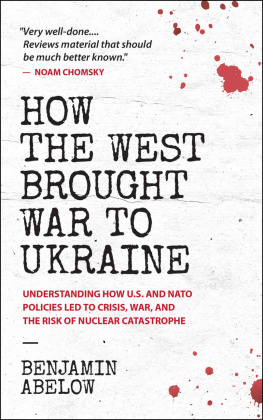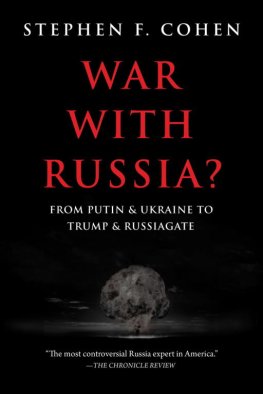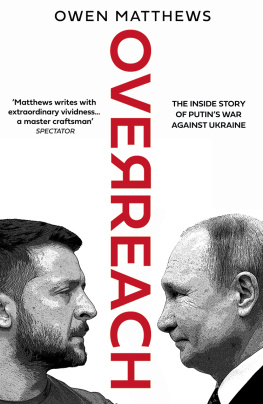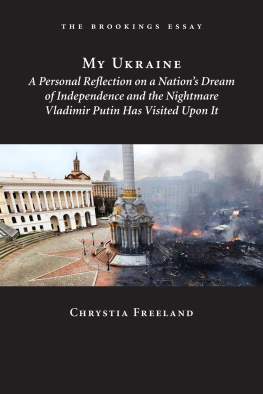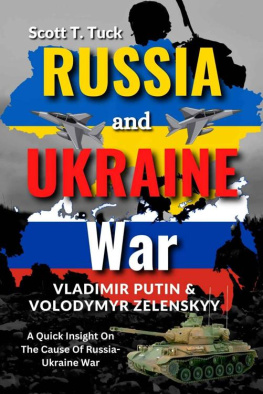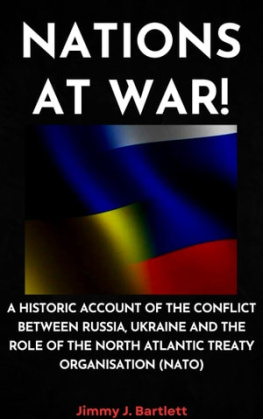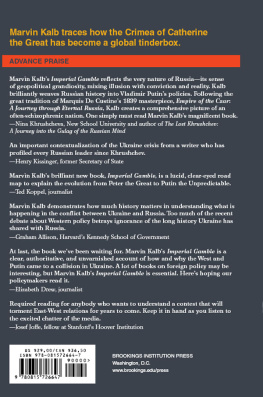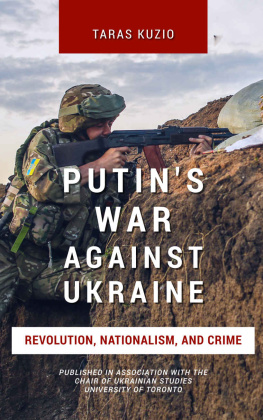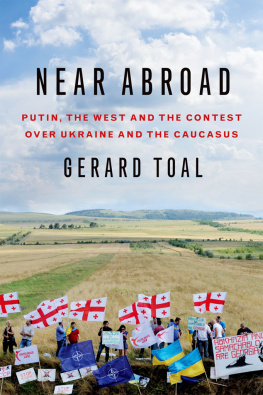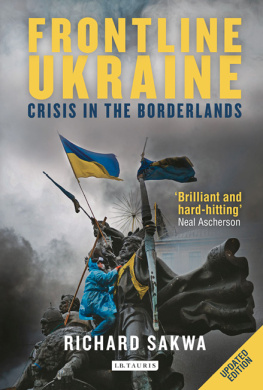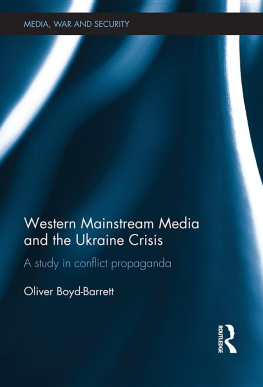Praise for
How the West Brought War to Ukraine
This is a splendid little book, tautly written, logically organized, easy to read, and persuasive but appropriately caveated. It is an invaluable primer on the trends and events that produced the escalating warfare in Ukraine. Without understanding the history documented in this book, there will be no de-escalation of the U.S.-Russian confrontation on Europes eastern borders.
Chas Freeman, previously Assistant Secretary of Defense for International Security Affairs, author of Arts of Power: Statecraft and Diplomacy
A brilliant, remarkably concise explanation of the danger that U.S. and NATO military involvement in Ukraine has created. Needs to be read and pondered by every citizen capable of thinking rationally and responsibly about American and European security.
Jack F. Matlock, Jr., U.S. Ambassador to the Soviet Union, 1987-1991, author of Superpower Illusions
Very well-done, very reasonable. Reviews material that should be much better known.
Noam Chomsky, Institute Professor emeritus, Massachusetts Institute of Technology, and Laureate Professor of Linguistics, University of Arizona
For those concerned about U.S. national security and the peace of Europe, this book is essential reading.
Douglas Macgregor, Colonel (Retired), U.S. Army, author of Margin of Victor, was decorated for valor in the Battle of 73 Easting in Iraq and served as Director of NATOs Joint Operations Center at SHAPE (Supreme Headquarters Allied Powers Europe)
For anyone interested in understanding the true causes of the disaster in Ukraine, How the West Brought War to Ukraine is required reading. Abelow makes a clear and compelling case that the United States and its NATO alliesnot Vladimir Putinare the principal culprits.
John J. Mearsheimer, author of The Tragedy of Great Power Politics, is the R. Wendell Harrison Distinguished Service Professor of Political Science at the University of Chicago
A concise yet comprehensive and accessible overview. Invaluable for understanding how war once again came to Europe. Benjamin Abelow demonstrates that the crisis in Ukraine was predictable, predictedand avoidable.
Richard Sakwa, author of Frontline Ukraine and The Putin Paradox, is Professor of Russian and European Politics, University of Kent
Ben Abelow takes us beyond the false narratives and into the truth of the Ukraine crisis.
Krishen Mehta, Senior Global Justice Fellow, Yale University, and Director, American Committee for US-Russia Accord
In the Ukraine proxy war between the United States/NATO and Russia, we face a threat of nuclear escalation that could end human civilization. Abelows book is essential reading for all who wish to understand this threat and why, 30 years after the collapse of the Soviet Union, it has re-emerged.
Gilbert Doctorow, author of Memoirs of a Russianist, is an historian and independent Russia specialist based in Brussels Headquarters Allied Powers Europe)
Copyright 2022 Benjamin Abelow.
All rights reserved. No part of this book may be copied, recorded, scanned, transmitted, downloaded, or distributed in any form or by any means, or stored in a data base or retrieval system, without written permission of the author. Short text passages may be reproduced with appropriate citation as part of larger works, such as reviews, articles, books, websites, and blogs. For clarifications, questions, and inquiries, please email the publisher.
Siland Press
Great Barrington, Massachusetts
Disclaimer: Careful efforts have been made to ensure the accuracy of the information contained in this book. However, because human error can occur, and because underlying source documents or secondary sources sometimes contain mistakes, no guarantee can be offered about the accuracy of everything contained herein.
Cover design by Boja@99designs.
ISBN: 978-0-9910767-1-0
Library of Congress Control Number: 2022911492
Publishers Cataloging-in-Publication Data
Names: Abelow, Benjamin, author
Title: How the West brought war to Ukraine : understanding how U.S. and NATO policies led to crisis, war, and the risk of nuclear catastrophe / Benjamin Abelow
Description: [Great Barrington, Massachusetts] : Siland Press, [2022] | Includes bibliographical references and index.
Identifiers: ISBN: 978-0-9910767-0-3 (paperback) | 978-0-9910767-1-0 (ebook) | LCCN: 2022911492
Subjects: LCSH: Ukraine Conflict, 2014- | United StatesForeign relationsRussia (Federation) | North Atlantic Treaty Organization. | North Atlantic Treaty OrganizationUkraine. | EuropeForeign relationsRussia (Federation)21st century. | Western countriesForeign relationsRussia (Federation)21st century. | National securityEurope. | National securityUnited States. | Russia (Federation)Foreign relations21st century. | Security, InternationalEuropeHistory21st century. | Cuban Missile Crisis, 1962. | South Ossetia War, 2008. | Nuclear arms control. | Nuclear crisis control. | Nuclear warfare. | Geopolitics. | Baltic StatesStrategic aspects. | World politics. | International relations. | Political science. | BISAC: HISTORY / Wars & Conflicts / General. | POLITICAL SCIENCE / International Relations / General. | POLITICAL SCIENCE / Security (National & International) | POLITICAL SCIENCE / World / Russian & Former Soviet Union.
Classification: LCC: DK508.852 .A24 2022 | DDC: 947.7086--dc23
Acknowledgements
For answering technical questions, commenting on previous drafts, or providing other kinds of help, I wish to thank Major Brennan Deveraux, Jay R. Feierman, Richard Sakwa, Gilbert Doctorow, George Goss, Viktoryia Baum, Pam Auerbach, Mark McCarty, John Hayden, Alex Tabarrok, Adam Abelow, Kimberly Peticolas, and Jonathan Rubin. The inclusion of a name here does not imply endorsement of the ideas expressed in this book. All views, as well as any errors of fact, interpretation, or judgment, are the sole responsibility of the author.
Contents
Overview
For almost 200 years, starting with the framing of the Monroe Doctrine in 1823, the United States has asserted security claims over virtually the whole Western hemisphere. Any foreign power that places military forces near U.S. territory knows it is crossing a red line. U.S. policy thus embodies a conviction that where a potential opponent places its forces is crucially important. In fact, this conviction is the cornerstone of American foreign and military policy, and its violation is considered reason for war.
Yet when it comes to Russia, the United States and its NATO allies have acted for decades in disregard of this same principle. They have progressively advanced the placement of their military forces toward Russia, even to its borders. They have done this with inadequate attention to, and sometimes blithe disregard for, how Russian leaders might perceive this advance. Had Russia taken equivalent actions with respect to U.S. territorysay, placing its military forces in Canada or MexicoWashington would have gone to war and justified that war as a defensive response to the military encroachment of a foreign power.
When viewed through this lens, Russias invasion of Ukraine is seen not as the unbridled expansionism of a malevolent Russian leader but as a violent and destructive reaction to misguided Western policies: an attempt to reestablish a zone around Russias western border that is free of offensive threats from the United States and its allies. Having misunderstood why Russia invaded Ukraine, the West is now basing existential decisions on false premises. In doing so, it is deepening the crisis and may be sleepwalking toward nuclear war.

